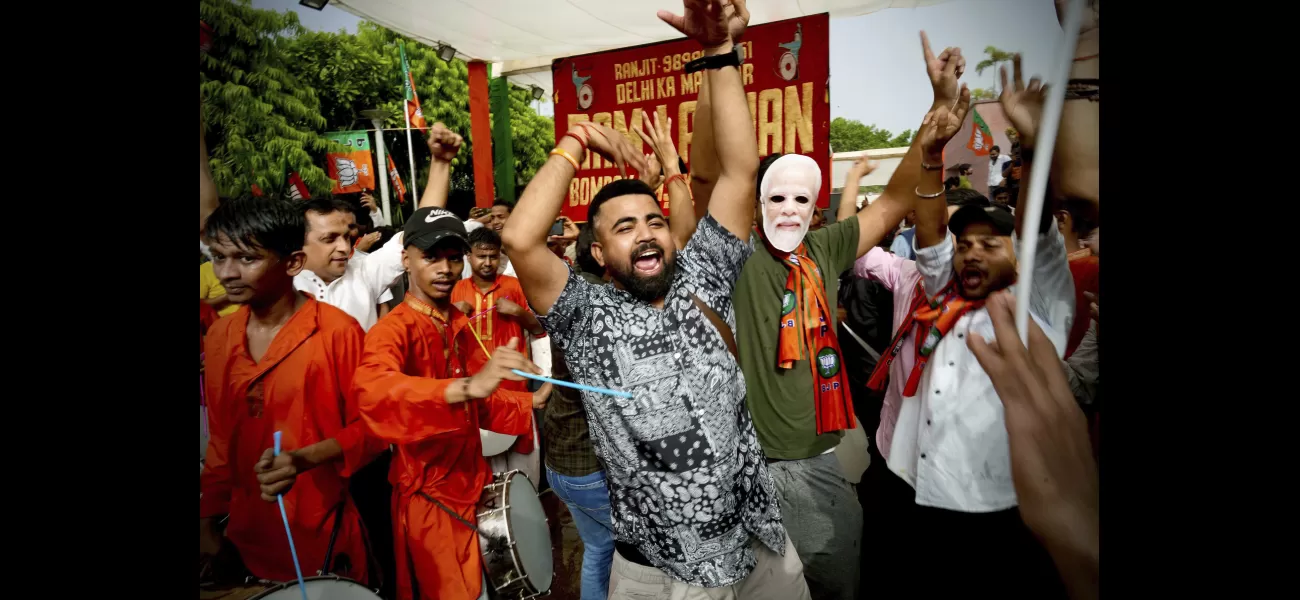Modi wins record-breaking election, hailed as a historic accomplishment.
Congress party says Modi's win is a moral and political defeat.
June 4th 2024.

Indian Prime Minister Narendra Modi has declared victory for his political alliance in the general election, despite facing some challenges from the opposition. Modi's party, the Bharatiya Janata Party (BJP), faced a stronger challenge than expected due to criticism of his economic policies and polarizing politics.
Speaking at his party headquarters, Modi stated that this victory belongs to the world's largest democracy. However, for the first time since the BJP came into power in 2014, they may not secure a majority on their own. Nevertheless, Modi is still expected to be elected for a third term in this massive democratic exercise.
If Modi has to rely on coalition support to govern, it would be a huge blow for the 73-year-old leader who had hoped for a landslide victory. Despite this setback, many of the Hindu nationalist policies that he has implemented in the past 10 years remain in place.
Modi promised to fulfill his campaign promises of boosting India's economy, which is currently the world's fifth-largest, to third place. He also pledged to focus on defense production, job creation for the youth, increasing exports, and supporting farmers.
In the face of surprising results, both sides are claiming some sort of victory. Modi wrote on social media that the people have placed their faith in the National Democratic Alliance (NDA), which his party leads. The main opposition party, Congress, stated that this election was a "moral and political loss" for Modi.
The counting of votes, which were cast over six weeks by more than 640 million people, is expected to continue all day and early figures may change. In his 10 years in power, Modi has transformed the political landscape of India by bringing Hindu nationalism into the mainstream. However, this has also led to a deep divide within the country.
Modi's supporters see him as a strong leader who has improved India's standing in the world. On the other hand, his critics and opponents claim that his Hindu-first politics have fueled intolerance and widened economic inequality.
After counting for about eight hours, the Election Commission reported that the BJP was leading in 231 constituencies and had won 13 seats. The Congress party was leading in 93 constituencies and had won four. A majority of 272 seats is needed to form a government.
Exit polls had predicted a landslide victory for the NDA, with more than 350 seats. However, the Indian markets, which had reached an all-time high on Monday, closed sharply down after the early results were announced. This caused surprise and confusion among many, including Mangesh Mahadeshwar in Mumbai.
The Election Commission does not release data on the percentage of votes counted, but the early results showed that the NDA and the INDIA alliance, which includes the Congress party, were leading in 277 and 220 constituencies respectively. The final results may differ as the counting continues.
Overall, this election has been a significant event for India's democracy, with the country's future direction at stake. It will be interesting to see how the final results unfold and what impact they will have on the nation's political landscape.
Indian Prime Minister Narendra Modi declared victory for his alliance in India's general election, even though his own party didn't perform as well as expected. The Bharatiya Janata Party (BJP), led by Modi, faced a tougher challenge from the opposition than anticipated. The opposition criticized Modi's mixed economic record and divisive approach to politics.
Addressing his supporters at the BJP headquarters, Modi said, "Today's victory is not just for our party, but for the world's largest democracy." This statement reflects the significance of the election in India, which has the largest democratic exercise in the world. Despite facing a potential loss of majority in Parliament, Modi was still expected to secure a third five-year term as prime minister.
If Modi's party has to rely on forming a coalition government, it would be a major setback for the 73-year-old leader. Throughout his tenure, Modi has implemented various Hindu nationalist policies that have drawn both praise and criticism. Despite the mixed results in this election, these policies are likely to remain in place.
Modi promised to continue his efforts to boost India's economy, which is currently the world's third largest but he aims to move it up to the fifth spot. He also pledged to focus on defense production, job creation for the youth, increasing exports, and supporting farmers. "This country will see a new chapter of big decisions. This is my guarantee," Modi confidently declared, referring to himself in the third person.
As the vote counting continued, both the BJP and the opposition Congress party claimed partial victory. Modi took to social media to express his gratitude and called the BJP's potential third consecutive term in power a "historical feat." On the other hand, Congress party President Mallikarjun Kharge called it a "moral and political loss" for Modi.
The counting process was expected to take the entire day, and early figures could change. In his 10 years as prime minister, Modi has significantly changed India's political landscape, bringing Hindu nationalism into the mainstream. While his supporters admire his strong leadership and India's improved global standing, his critics and opponents argue that his policies have fueled intolerance and widened economic inequality.
Early data from the Election Commission showed that the BJP was leading in 231 out of 543 parliamentary seats and had won 13, including one uncontested seat. The Congress party was leading in 93 seats and had won four. A majority of 272 seats is needed to form a government. In the previous election, held in 2019, the BJP won 303 seats, while in 2014, when Modi first came to power, it secured 282 seats.
The BJP is part of the National Democratic Alliance, which was leading in 277 seats and had won 15, according to the early count. The Congress party is part of the INDIA alliance, which led in 220 seats and had won five. The Election Commission did not release data on the percentage of votes counted.
The early results were surprising, as exit polls over the weekend had projected a landslide victory for the BJP-led NDA with over 350 seats. The Indian markets, which had reached an all-time high on Monday, closed sharply down on Tuesday, with the benchmark stock indices, NIFTY 50 and BSE Sensex, dropping by over 5%.
Mangesh Mahadeshwar, a resident of Mumbai, was among the many who were taken aback by the unexpected results of the election. It just goes to show that anything can happen in politics, and the final outcome may not always align with initial expectations.
Speaking at his party headquarters, Modi stated that this victory belongs to the world's largest democracy. However, for the first time since the BJP came into power in 2014, they may not secure a majority on their own. Nevertheless, Modi is still expected to be elected for a third term in this massive democratic exercise.
If Modi has to rely on coalition support to govern, it would be a huge blow for the 73-year-old leader who had hoped for a landslide victory. Despite this setback, many of the Hindu nationalist policies that he has implemented in the past 10 years remain in place.
Modi promised to fulfill his campaign promises of boosting India's economy, which is currently the world's fifth-largest, to third place. He also pledged to focus on defense production, job creation for the youth, increasing exports, and supporting farmers.
In the face of surprising results, both sides are claiming some sort of victory. Modi wrote on social media that the people have placed their faith in the National Democratic Alliance (NDA), which his party leads. The main opposition party, Congress, stated that this election was a "moral and political loss" for Modi.
The counting of votes, which were cast over six weeks by more than 640 million people, is expected to continue all day and early figures may change. In his 10 years in power, Modi has transformed the political landscape of India by bringing Hindu nationalism into the mainstream. However, this has also led to a deep divide within the country.
Modi's supporters see him as a strong leader who has improved India's standing in the world. On the other hand, his critics and opponents claim that his Hindu-first politics have fueled intolerance and widened economic inequality.
After counting for about eight hours, the Election Commission reported that the BJP was leading in 231 constituencies and had won 13 seats. The Congress party was leading in 93 constituencies and had won four. A majority of 272 seats is needed to form a government.
Exit polls had predicted a landslide victory for the NDA, with more than 350 seats. However, the Indian markets, which had reached an all-time high on Monday, closed sharply down after the early results were announced. This caused surprise and confusion among many, including Mangesh Mahadeshwar in Mumbai.
The Election Commission does not release data on the percentage of votes counted, but the early results showed that the NDA and the INDIA alliance, which includes the Congress party, were leading in 277 and 220 constituencies respectively. The final results may differ as the counting continues.
Overall, this election has been a significant event for India's democracy, with the country's future direction at stake. It will be interesting to see how the final results unfold and what impact they will have on the nation's political landscape.
Indian Prime Minister Narendra Modi declared victory for his alliance in India's general election, even though his own party didn't perform as well as expected. The Bharatiya Janata Party (BJP), led by Modi, faced a tougher challenge from the opposition than anticipated. The opposition criticized Modi's mixed economic record and divisive approach to politics.
Addressing his supporters at the BJP headquarters, Modi said, "Today's victory is not just for our party, but for the world's largest democracy." This statement reflects the significance of the election in India, which has the largest democratic exercise in the world. Despite facing a potential loss of majority in Parliament, Modi was still expected to secure a third five-year term as prime minister.
If Modi's party has to rely on forming a coalition government, it would be a major setback for the 73-year-old leader. Throughout his tenure, Modi has implemented various Hindu nationalist policies that have drawn both praise and criticism. Despite the mixed results in this election, these policies are likely to remain in place.
Modi promised to continue his efforts to boost India's economy, which is currently the world's third largest but he aims to move it up to the fifth spot. He also pledged to focus on defense production, job creation for the youth, increasing exports, and supporting farmers. "This country will see a new chapter of big decisions. This is my guarantee," Modi confidently declared, referring to himself in the third person.
As the vote counting continued, both the BJP and the opposition Congress party claimed partial victory. Modi took to social media to express his gratitude and called the BJP's potential third consecutive term in power a "historical feat." On the other hand, Congress party President Mallikarjun Kharge called it a "moral and political loss" for Modi.
The counting process was expected to take the entire day, and early figures could change. In his 10 years as prime minister, Modi has significantly changed India's political landscape, bringing Hindu nationalism into the mainstream. While his supporters admire his strong leadership and India's improved global standing, his critics and opponents argue that his policies have fueled intolerance and widened economic inequality.
Early data from the Election Commission showed that the BJP was leading in 231 out of 543 parliamentary seats and had won 13, including one uncontested seat. The Congress party was leading in 93 seats and had won four. A majority of 272 seats is needed to form a government. In the previous election, held in 2019, the BJP won 303 seats, while in 2014, when Modi first came to power, it secured 282 seats.
The BJP is part of the National Democratic Alliance, which was leading in 277 seats and had won 15, according to the early count. The Congress party is part of the INDIA alliance, which led in 220 seats and had won five. The Election Commission did not release data on the percentage of votes counted.
The early results were surprising, as exit polls over the weekend had projected a landslide victory for the BJP-led NDA with over 350 seats. The Indian markets, which had reached an all-time high on Monday, closed sharply down on Tuesday, with the benchmark stock indices, NIFTY 50 and BSE Sensex, dropping by over 5%.
Mangesh Mahadeshwar, a resident of Mumbai, was among the many who were taken aback by the unexpected results of the election. It just goes to show that anything can happen in politics, and the final outcome may not always align with initial expectations.
[This article has been trending online recently and has been generated with AI. Your feed is customized.]
[Generative AI is experimental.]
0
0
Submit Comment





